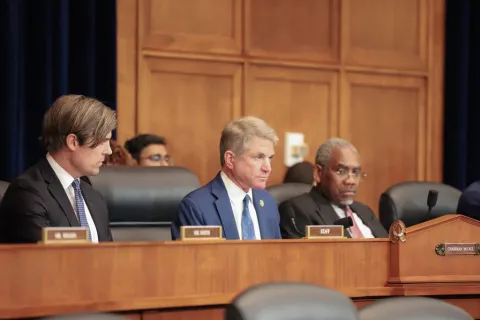Chairman McCaul Delivers Remarks at Full Committee Hearing Examining Flow of U.S. Dollars to CCP
Washington, D.C. – Today, House Foreign Affairs Committee Chairman Michael McCaul delivered remarks at a full committee hearing to examine the flow of U.S. monies into the Chinese Communist Party's (CCP) military-industrial complex. During his opening statement, Chairman McCaul highlighted the importance of restricting the outbound flow of money and national security-related technologies to the repressive CCP, which continues to undermine U.S. national security interests, surveil its own citizens, and commit serious human rights abuses within its own borders.
– Remarks as Delivered –
The Chinese Communist Party's goals and actions are a clear and present danger to the security interests of the United States and our allies.
We are in a generational competition with a determined adversary, set on upending the global balance of power.
Technology is at the center of this competition, and the CCP is using it as a weapon for its military and surveillance state.
These technologies can be used to advocate and safeguard democracy, or they can be used for subversion and oppression.
We must understand that whoever controls the best technology will likely prevail in this great power competition.
While we can restrict China's access to U.S. critical technology through export controls, we can't stop big investors from using their money, know-how, and network to help build highly advanced technology companies in China.
Regrettably, U.S. money is fueling the CCP war machine and surveillance state.
Look no further than the CCP's dystopian oppression of the Uyghurs, [or] the successful hypersonic missile test which circled the globe and landed with precision.
That was built on the backbone of U.S. technology.
The Ranking Member and I were disturbed that we have no effective tools to stop these key investments.
They harm U.S. national security and endanger our partners and allies, like Taiwan. We also want to congratulate Taiwan on their recent elections, and to the [Democratic Progressive Party].
So, the Ranking Member and I acted.
In November, this committee, on a unanimous, bipartisan basis, passed the Preventing Adversaries from Developing Critical Capabilities Act.
This bill has been one of the most important steps this committee has taken to protect U.S. national security and counter the CCP.
This bill may also be one of the most bipartisan efforts that we've worked on.
This effort spans the past two administrations.
It was then-Secretary Mike Pompeo, who urged me in 2020, to stop the flow of U.S. money into national security sectors in China. The Trump national security team supports this legislation, but so does the Biden administration.
More recently, it was the Biden administration took that idea and developed an Executive Order targeting outbound rule.
With Ranking Member Meeks and a growing roster of members, as well as outside groups, like Hudson, Heritage, and American Compass, we planned to get this bill signed into law. We thought we had it done in the National Defense Authorization [Act]—it got pulled. We need to get this new version that was introduced by the Ranking Member [and] myself, signed into law. We cannot wait.
This hearing today plays an important role in that process.
The witnesses today were selected by both of us.
This hearing should help clear up a lot of misconceptions about the threat, current situation, and examine tangible solutions.
It should come as no surprise that China's military and surveillance state are exploiting loopholes in U.S. policy to access billions of U.S. investment dollars and expertise.
We know that U.S. investment has not democratized China.
And companies which are controlled by the CCP have no power over the applications of their technology.
The CCP can direct it to be used for military or surveillance purposes.
We know China's Military-Civil Fusion Strategy undermines an entity-by-entity sanctions approach, and instead requires country-wide prohibitions for key technologies.
Ranking Member Meeks and I requested the Treasury Department [decide] whether to sanction Hikvision, a CCP surveillance company contributing to the Uighur genocide, but Treasury decided not to sanction the company. That is the weakness of the sanction model. The Treasury Department will not sanction.
Our witnesses today can provide further evidence on all these points and articulate why an outbound forward-looking, sector-based regime is necessary.
We'll see that, whether Republican or Democrat, those that examine China objectively, analytically, and realistically have reached the same conclusion.
While our existing tools, such as sanctions, have an important role, they cannot be a substitute for an outbound investment regime that is authorized by Congress. And that is our goal.
Restricting key outbound investments in a whole-of-government approach ensures America's national security comes first.
###
